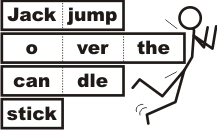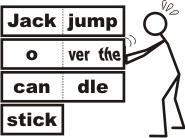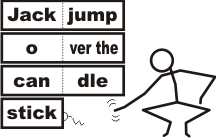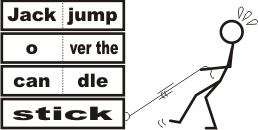

Prescanned Shakespeare.com
presented by Acoustic Learning
Your sense of equality guides your natural speech. That's why the following line has rhythm, even though it has the wrong number of syllables. Tap your finger with the natural stresses, and you will feel the regular beat.
Jack jump over the candlestick
, , , ,
Jack jump | over the | candle|stick
The second foot has too many syllables: three instead of two. But say it again, tapping your finger-- and notice how, when you say over the, you naturally speed up. You naturally equalize the foot by squeezing two syllables into the space of one.
 |
 |
Two short syllables can squeeze into one space.
, , 2 , ,
Jack jump | over the | candle|stick
The fourth foot is missing a syllable: one instead of two . But say the line twice, tapping your finger-- and notice how, when you say stick, you naturally allow that one syllable to "cover" the entire foot.
 |
 |
One extended syllable can fill a foot.
, , 2 , ___
Jack jump | over the | candle|stick
, , 2 , ___
Jack jump | over the | candle|stick
When you speak English, you naturally try to keep your stresses equally spaced. That's why the following line has a perfectly regular rhythm, even though it has an irregular quantity of syllables. You can say it out loud, tapping your finger, to confirm its regularity.
Many a quaint and curious volume of forgotten lore
These feet are equal because of you. You unconsciously speed up or extend syllables to fit them into the available space.
, 2 , , 2 , , , __
Many a | quaint and | curious | volume | of for|gotten | lore
Your sense of equality makes rhythmic variation possible. Poets can change the number of syllables in a foot, or switch the long syllable from side to side, because they can trust you to keep equal time.
<< Previous section |
Next section >> |
||
|
Order
the printed book of this online guide. Perfect paperback, 65 pp. |
All contents of this page are copyright ©2012 Acoustic Learning Inc. All rights reserved.